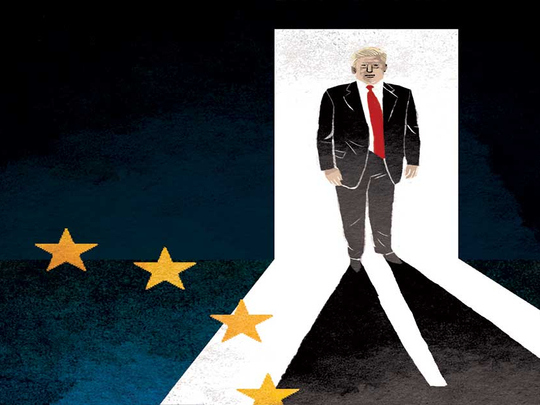
It is absolutely reasonable to worry about the future when the new resident of the White House officially moves in next month, regardless of whether he follows through on his pledges during the campaign or not. Never in the modern history of American presidential elections has a candidate shown such isolationist, anti-liberal and ‘America First’ rhetoric, causing such unprecedented alarm. Republican candidate Donald Trump’s surprise win in the United States presidential election has shocked everyone in every corner of the world, including his own sympathisers. The president-elect seemed, for a while during the campaign, almost unreal, as if a character had slipped out of a black comedy and stepped into real life.
One couldn’t help but remember the title Who’s afraid of Virginia Woolf?, a 1962 play by the great American playwright, the late Edward Albee. More importantly, the play examines the broken marriage of a middle-aged couple, Martha and George. It was selected in 2013 for preservation in the US National Film Registry by the Congress Library for its cultural greatness and historic significance.
Therefore, Trump’s victory is widely considered to be a first step in a gradual process towards a historically significant shift in the existing global order, that would presumably include a quick divorce from Europe, America’s US strategic ally for almost 100 years. New American administrations usually present themselves to the world as often as every four or eight years, in form and shape, as different from the one that immediately left the White House.
This has been the case more often than not. But it is evident that this has been the pattern since the Second World war at least. George W Bush, the 43rd president of the US, entered the race in 2000 focusing on “the national interest”, following former president Bill Clinton’s eight years of focussing mostly on globalisation and humanitarian intervention as seen in former Yugoslavia and the Middle East. The sitting US President, Barack Obama, has clearly distinguished himself by being the chief-of-staff who pulled his country’s army out of the world’s quagmires and put an end to the costly regime-change projects that overwhelmingly coloured the Bush administration after 9/11.
It is also noticeable that long before Trump’s election, particularly during Obama’s presidency, America’s standing in the world has been remarkably on a decline. US efforts and policies of supporting liberal international order up till the last decade is eroding fast and has almost disappeared under the Obama presidency. What will happen to this order once Trump, who openly opposes it, takes charge of US foreign policy”
The leading American scholar, Francis Fukuyama, well-known for his essay The End of History, has recently commented that America’s political rot is infecting the world order (and) the result of which could be as big as the collapse of the Soviet Union. Writing in next month’s issue of the British magazine Prospect, Fukuyama said: “The effects (of Trump’s win) are uncertain, but — in the worst case — they could lead to the US giving up entirely on global leadership and the unravelling of the liberal world order that it has done so much to build since 1950s.” The elevation of Trump from a mere “buffoonish fringe candidate taken seriously by no one, to the President-Elect of the United States”, Fukuyama added, “is one of the most unexpected and traumatic events in recent US history”.
What is at stake here is the democratic system itself with the rise of populist political movements, which would lead to polarisation within societies. “Add polarisation to the rise of powerful interest groups into the system,” Fukuyama says, and the result is what he describes as “vetocracy”. This is a “situation in which special interests can veto measures harmful to themselves, while collective action for the common good becomes exceedingly difficult to achieve”.
If Trump keeps up his promises, his election will undoubtedly mark a major shift in the US culture and political engagement with the world as it has been universally known up until now. His election has brought to the forefront the discussion on the role of the US in the world. This means a sharp turn to thoroughly adopt a narrow vision of nationalism, precisely the way Trump repeatedly explained it during campaign, saying how vital it was for the US to “become great again”.
The president-elect has made it abundantly clear that he is not into the business of returning to the neo-conservatism and liberal hawkishness that defined the Bush era, with promoting democracy under US military pressure as it has miserably failed in Iraq at an unprecedented cost to humanity and also in financial terms.
The expectations under Trump are very grim indeed for those who were hoping that Obama’s former foreign secretary, Hilary Clinton, would win the election. The new reality in Washington is causing a great deal of fear across the Atlantic as European politicians are struggling to adjust. For the first time ever in generations, politicians and policy analysts of the Left and Right are hearing calls by the forthcoming commander of the world’s supreme power, suggesting that his country is no longer able to guarantee its treaties with its own long-standing loyal allies.
Mustapha Karkouti is a former president of the Foreign Press Association, London. You can follow him on Twitter at www.twitter.com/@mustaphatashe.









